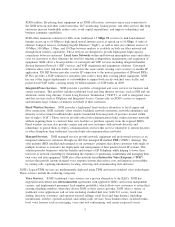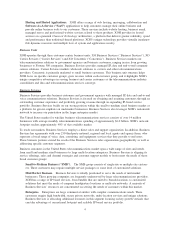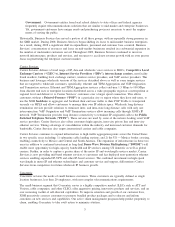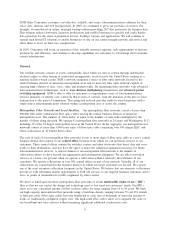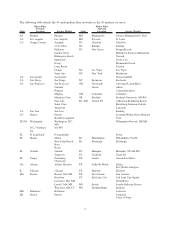XO Communications 2009 Annual Report Download - page 17
Download and view the complete annual report
Please find page 17 of the 2009 XO Communications annual report below. You can navigate through the pages in the report by either clicking on the pages listed below, or by using the keyword search tool below to find specific information within the annual report.rates for the origination and termination of telecommunications traffic. The FCC would have to take action
through an open rulemaking or begin a new rulemaking in order to turn these recommendations into
regulations. For this reason, we cannot predict what, if any, actions the FCC will take, when it may act or the
effect this will have on our future financial results.
Universal Service Administrative Corporation. The Universal Service Administrative Corporation is in the
process of auditing the Company’s compliance with universal service contribution reporting obligations in
connection with services provided during 2007. The Company believes that it complied with applicable FCC
rules in all material respects; however an adverse audit determination could result in significant retroactive
assessment of USF contribution liability and associated interest, penalties, fines or forfeitures.
State and Local Regulation
Most state regulatory commissions require companies that wish to provide intrastate common carrier services
to register or seek certification to provide these services. These certifications generally require a showing that
the carrier has adequate financial, managerial and technical resources to offer the proposed services in a
manner consistent with the public interest. We are certified in all of the states in which we conduct business.
In most states, we are also required to file tariffs setting forth the terms, conditions and prices for services that
are classified as intrastate, and to update or amend our tariffs as rates change or new services are added. We
may also be subject to various reporting and record-keeping requirements.
In some municipalities, where we choose to deploy our own POPs, we may be required to obtain street
opening and construction permits, permission to use rights-of-way, zoning variances and other approvals from
municipal authorities. We also may be required to obtain a franchise to place facilities in public rights-of-way.
In some areas, we may be required to pay license or franchise fees for these approvals. We cannot provide
assurances that fees will remain at current levels, or that our competitors will face the same expenses, although
the Telecom Act requires that any fees charged by municipalities be reasonable and non-discriminatory among
telecommunications carriers.
Wireless Services Affected by State Regulations. While we anticipate that the dedicated wireless communica-
tions links that XOH currently provides and expects to provide will be used by our customers as part of their
interstate mobile wireless communications networks, we market point-to-point wireless services designed to
carry a customer’s telecommunications traffic from a customer’s facility to the facilities of a telecommunica-
tions carrier or to another of the customer’s offices, primarily within one state. To the extent necessary, XOH
has applied for and anticipates that it will receive and maintain Certificates of Public Convenience and
Necessity, file tariffs and reports, and fulfill other administrative and financial obligations, such as state
universal service fund obligations, as appropriate relative to its services. XOH has received certificates from
28 state commissions.
Additional State and Local Regulation
XOCS Complaints Against Verizon. On April 18, 2008, XO Communications Services, Inc. (“XOCS”) an
indirect subsidiary of XOH, filed a formal complaint against Verizon Pennsylvania Inc. before the Pennsylva-
nia Public Utilities Commission. On December 14, 2009, XOCS filed a formal complaint against Verizon
New Jersey before the New Jersey Board of Public Utilities (the “BPU”) and sought consolidation of the
XOCS complaint proceeding with an on-going proceeding involving a similar complaint that One Communi-
cations filed against Verizon New Jersey in May, 2009. In the Pennsylvania and New Jersey complaints, XOCS
claimed that Verizon was erroneously, and in violation of its tariffs, assessing switched access dedicated
tandem trunk port charges on local interconnection trunks used to jointly provide switched access services to
third party interexchange carriers. In Pennsylvania, evidentiary hearings have been held, and briefs have been
submitted. The Pennsylvania Commission has not issued a final decision in this matter. However, in an almost
identical complaint filed by One Communications (“One”) and CTC Communications (’CTC”) against Verizon
regarding dedicated tandem trunk port charges on local interconnection trunks, the Pennsylvania PUC on
January 28, 2010 adopted the administrative law judge’s initial decision, which orders Verizon to discontinue
the imposition of the disputed charges on One and CTC and orders Verizon to reimburse One and CTC for all
dedicated tandem trunk port charges on local interconnection trunks previously paid by these entities. In
13


